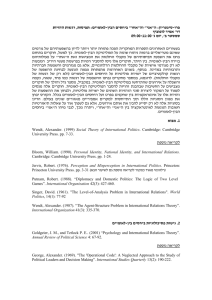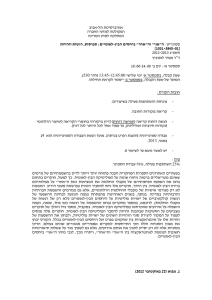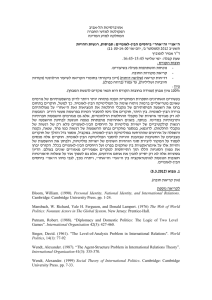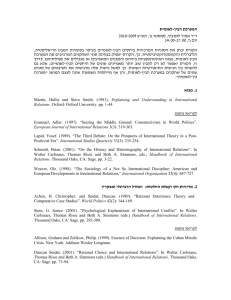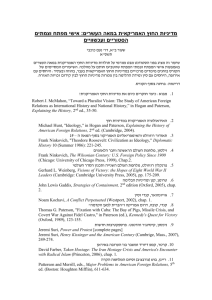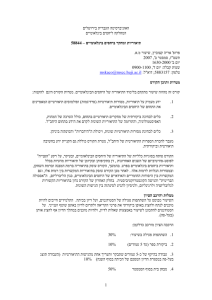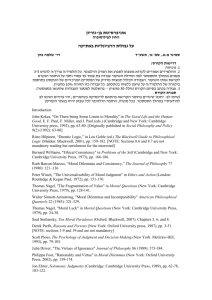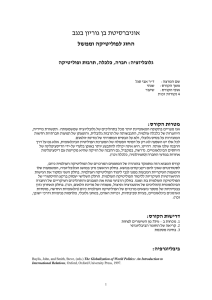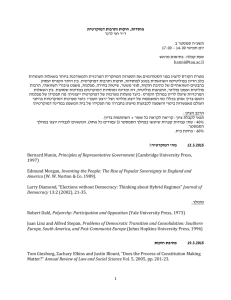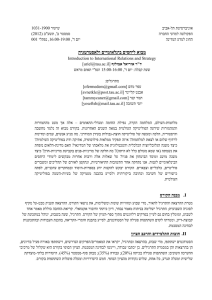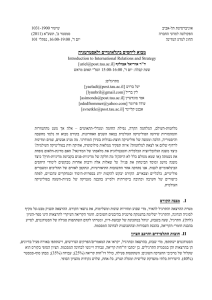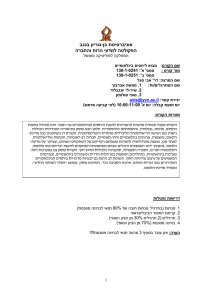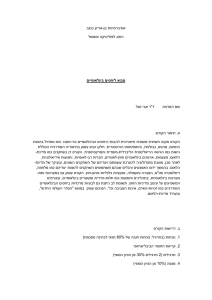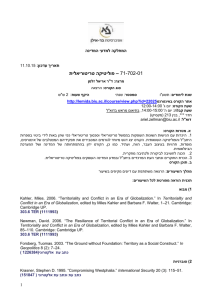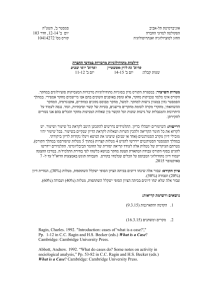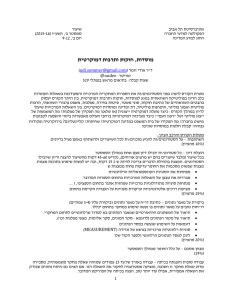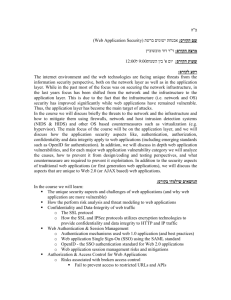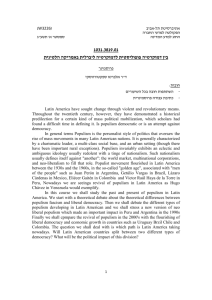לצפייה בסילבוס נא ללחוץ כאן
advertisement
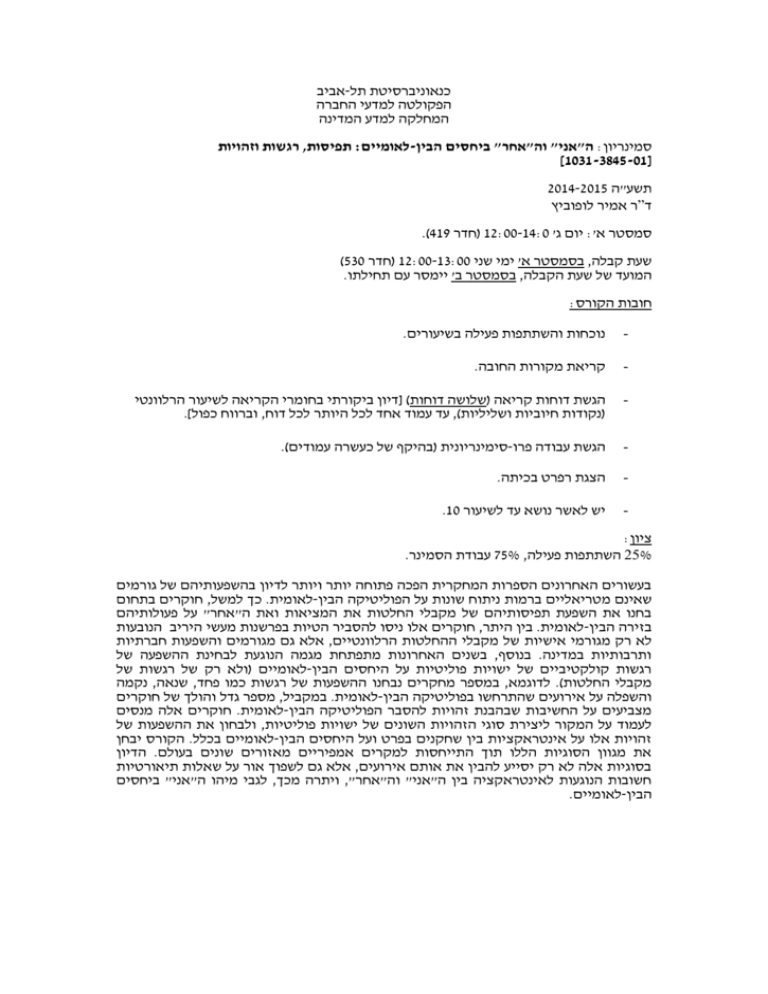
כנאוניברסיטת תל-אביב הפקולטה למדעי החברה המחלקה למדע המדינה סמינריון :ה"אני" וה"אחר" ביחסים הבין-לאומיים :תפיסות ,רגשות וזהויות []1301-0483-31 תשע"ה 5102-5102 ד”ר אמיר לופוביץ סמסטר א' :יום ג' ( 05:11-02:1חדר .)204 שעת קבלה ,בסמסטר א' ימי שני ( 05:11-01:11חדר )211 המועד של שעת הקבלה ,בסמסטר ב' יימסר עם תחילתו. חובות הקורס: - נוכחות והשתתפות פעילה בשיעורים. - קריאת מקורות החובה. - הגשת דוחות קריאה (שלושה דוחות) [דיון ביקורתי בחומרי הקריאה לשיעור הרלוונטי (נקודות חיוביות ושליליות) ,עד עמוד אחד לכל היותר לכל דוח ,וברווח כפול]. - הגשת עבודה פרו-סימינריונית (בהיקף של כעשרה עמודים). - הצגת רפרט בכיתה. - יש לאשר נושא עד לשיעור .01 ציון: 52%השתתפות פעילה 52% ,עבודת הסמינר. בעשורים האחרונים הספרות המחקרית הפכה פתוחה יותר ויותר לדיון בהשפעותיהם של גורמים שאינם מטריאליים ברמות ניתוח שונות על הפוליטיקה הבין-לאומית .כך למשל ,חוקרים בתחום בחנו את השפעת תפיסותיהם של מקבלי החלטות את המציאות ואת ה"אחר" על פעולותיהם בזירה הבין-לאומית .בין היתר ,חוקרים אלו ניסו להסביר הטיות בפרשנות מעשי היריב הנובעות לא רק מגורמי אישיות של מקבלי ההחלטות הרלוונטיים ,אלא גם מגורמים והשפעות חברתיות ותרבותיות במדינה .בנוסף ,בשנים האחרונות מתפתחת מגמה הנוגעת לבחינת ההשפעה של רגשות קולקטיביים של ישויות פוליטיות על היחסים הבין-לאומיים (ולא רק של רגשות של מקבלי החלטות) .לדוגמא ,במספר מחקרים נבחנו ההשפעות של רגשות כמו פחד ,שנאה ,נקמה והשפלה על אירועים שהתרחשו בפוליטיקה הבין-לאומית .במקביל ,מספר גדל והולך של חוקרים מצביעים על החשיבות שבהבנת זהויות להסבר הפוליטיקה הבין-לאומית .חוקרים אלה מנסים לעמוד על המקור ליצירת סוגי הזהויות השונים של ישויות פוליטיות ,ולבחון את ההשפעות של זהויות אלו על אינטראקציות בין שחקנים בפרט ועל היחסים הבין-לאומיים בכלל .הקורס יבחן את מגוון הסוגיות הללו תוך התייחסות למקרים אמפיריים מאזורים שונים בעולם .הדיון בסוגיות אלה לא רק יסייע להבין את אותם אירועים ,אלא גם לשפוך אור על שאלות תיאורטיות חשובות הנוגעות לאינטראקציה בין ה"אני" וה"אחר" ,ויתרה מכך ,לגבי מיהו ה"אני" ביחסים הבין-לאומיים. )8313 באוקטובר84( מבוא.1 אין קריאת חובה לקריאה נוספת למבוא Bloom, William. (1990). Personal Identity, National Identity, and International Relations. Cambridge: Cambridge University Press. pp. 1-24. Jervis, Robert. (1976). Perception and Misperception in International Politics. Princeton: Princeton University Press. pp. 3-31 (רלוונטי מאוד כמקור לקריאה נוספת גם )לשיעור הבא Putnam, Robert. (1988). “Diplomacy and Domestic Politics: The Logic of Two Level Games”. International Organization 42(3): 427-460. Singer, David. (1961). "The Level-of-Analysis Problem in International Relations". World Politics, 14(1): 77-92 Wendt, Alexander. (1987). “The Agent-Structure Problem in International Relations Theory”. International Organization 41(3): 335-370. Wendt, Alexander. (1999) Social Theory of International Politics. Cambridge: Cambridge University Press. pp. 7-33. )8313 בנובמבר4( - גישות פסיכולוגיות.8 Goldgeier, J. M., and Tetlock P. E.. (2001) “Psychology and International Relations Theory”. Annual Review of Political Science 4: 67-92. ,לקריאה נוספת Levy, S. Jack. (1992). “Prospect Theory and International Relations: Theoretical Applications and Analytical Problems”. Political Psychology 13 (2): 283-310. Jervis, Robert. (1992). “Political Implications of Loss Aversion”. Political Psychology 13 (2): 187-204. Jervis, Robert. (1976). Perception and Misperception in International Politics. Princeton: Princeton University Press. Mintz, Alex and DeRouen Karl Jr. (2010). Understanding Foreign Policy Decision Making. Cambridge: Cambridge University Press. )8313 בנובמבר11( לאומיים- תרבות ביחסים הבין.0 Desch, Michael. 1998. “Culture Clash: Assessing the Importance of Ideas in Security Studies”. International Security 23(1): 141-70. לקריאה נוספת על תרבות Cohen, Raymond. (1996). Negotiating Across Cultures: International Communication in an Interdependent World. Washington: United States Institute of Peace Press. pp. 9-44. Farrell, Theo. (1998). “Culture and Military Power”. Review of International Studies 24(3): 407-416. Glenn, John. (2009). “Realism versus Strategic Culture: Competition and Collaboration?” International Studies Review 11(3): 523-51. Johnston, Iain Alastair. (1995). “Thinking about Strategic Culture”. International Security 19(4): 32-64. Krause, R. Keith. (1999). "Cross Cultural Dimensions of Multilateral NonProliferation and Arms Control Dialogues: An Overview”. In Keith R. Krause (ed.) Culture and Security. London: Frank Cass. pp. 1-22. Van Evera, Stephen. (1984). "The Cult of the Offensive and the Origins of the First World War”. International Security 9(1): 58-107. Weldes, Jutta, Laffe Mark, Gusterson Hugh, and Duvall Raymond. (1999). “Indroduction: Constructing Insecurity.” In Jutta Weldes, Mark Laffey, Hugh Gusterson and Raymond Duvall (eds.). Cultures of Insecurity: States, Communities and the Production of Danger. Minneapolis: University of Minnesota Press. pp. 1-33. , ראו למשל,הנטינגטון והביקורות עליו Huntington, Samuel. (1996). The Clash of Civilizations and the Remaking of World Order. New York: Simon & Shuster. pp. 19-55. Henderson, Errol and Tucker, Richard. (2001). Clear and Present Strangers: The Clash of Civilizations and International Conflict. International Studies Quarterly 45: 317-338. Russett, M. Bruce; Oneal, John. R. and Cox, Michaelene. (2000). "Clash of Civilizations, or Realism and Liberalism Déjà Vu? Some Evidence" Journal of Peace Research 37(5): 583–608. Rubenstein, Richard E. and Jarle Crocker.) (1994). Challenging Huntington Foreign Policy 96: 113-128. לתשובה של הנטינטון לחלק מהביקורות Huntington, Samuel. (1993). "If Not Civilizations, What? Samuel Huntington Responds to His Critics," Foreign Affairs. 72(5). )8313 בנובמבר14( רגשות ברמת הפרט+ הקדמהI שיעור:לאומיים- רגשות ביחסים בין.8 Crawford, Neta. (2000). “The Passion of World Politics: Propositions on Emotion and Emotional Relationships”. International Security 24(4): 116-156. ,לקריאה נוספת Auerbach, Yehudit. (1986) “Turning-Point Decisions: A Cognitive-Dissonance Analysis of Conflict Reduction in Israeli-West German Relations”. Political Psychology 7(3): 533-50. Holsti, Ole R. and Alexander L. George. (1975). "The Effects of Stress on the Performance of Foreign Policy-Makers". In Cornelius P. Cotter (ed.) Political Science Annual, Vol. 6: 255-319. Hymans, E. C. Jacques. (2006). The psychology of Nuclear Proliferation: ,ytntne, ycintitn, et, inyt,t oittme. Cambridge: Cambridge University Press. pp. 16-46. McDermott, Rose. (2004). “The Feeling of Rationality: The Meaning of Neuroscientific Advances for Political Science”. Perspectives on Politics 2(4): 691706. Lebow, Ned. (2005). "Reason, Emotion and Cooperation". International Politics. 42(3): 283-313. Ross, A. G. Andrew. (2006). “Coming in From the Cold:” Constructivism and the Emotions”. European Journal of International Relations 12(2): 197-222. Mercer, Jonathan. (2010). “Deterrence and Emotional Beliefs”. International Organization 64(1): 1-31. )8313 בנובמבר83( ) (רגשות ברמת הקולקטיבII שיעור:לאומיים- רגשות ביחסים בין.3 Löwenheim, Oded and Heimann, Gadi. (2008/9). “Revenge in International Politics”. Security Studies 17(4): 1-40. ,לקריאה נוספת .חברתי של החברה היהודית בישראל- ניתוח פסיכולוגי. לחיות עם הסכסוך.)5115( . דניאל,טל-בר .555-110 ' עמ. כרמל:ירושלים Danjoux, Ilan. (2006) “The Political Cartoon and the Collapse of the Oslo Peace Process,” paper presented at the 47th Annual Convention of the International Studies Association, March 2006, San Diego, California. Fattah, Khaled and Fierke, K, M. (2009). “A Clash of Emotions: The Politics of Humiliation and Political Violence in the Middle East”. European Journal of International Relations. 15(1): 67-93 Kaufman, Stuart. (2001) Modern Hatreds: The Symbolic Politics of Ethnic War. Ithaca: Cornell University Press. pp. 15-84. Ross, A. G. Andrew. (2014). Mixed Emotions. Beyond Fear and Hatred in International Conflicts. Chicago: Chicago University Press. Sasley, E. Brent. (2011), Theorizing States’ Emotions. International Studies Review 13(3): 452-476. Saurette, Paul. (2006) You Dissin me? Humiliation and Post 9/11 Global Politics. Review of International Studies 32(3): 495-522 Small, A. Deborah, Lerner S. Jennifer and Fischhoff, Baruch. (2006). "Emotion Priming and Attributions for Terrorism: Americans' Reactions in a National Field Experiment ". Political Psychology 27(2). pp. 289-298. Sucharov M. Mira (2005). The International Self. Psychoanalysis and the Search for Israeli-Palestinian Peace. New York, Albany: State University of New York Press. Sucharov, M. Mira. (2013). Imagining Ourselves then and Now: Nostalgia and Canadian Multiculturalism. Journal of International Relations and Development (2013) 16: 539–565. )8313 בדצמבר8( זיכרון קולקטיבי.6 .חברתי של החברה היהודית בישראל- ניתוח פסיכולוגי. לחיות עם הסכסוך.)5115( . דניאל,טל-בר .005-015 ' עמ. כרמל:ירושלים Confino, Alon. (1997). “Collective Memory and Cultural History: Problems of Method” The American Historical Review 102(5): 1386-1403. ,לקריאה נוספת על זיכרון קולקטיבי Booth, James William. (2006). Communities of memory: on witness, identity, and justice. Ithaca: Cornell University Press pp. 1-38. Löwenheim, Nava. (2009). “A Haunted Past: Requesting Forgiveness for Wrongdoing in International Relations”. Review of International Studies 35(3): 531-555 Olick, Jeffrey K.; Robbins, Joyce. (1998). “Social memory studies: from "collective memory" to the historical sociology of mnemonic practices”. Annual Review of Sociology 24(1): 105-140. ,לאומיים של כתיבת חוקות-ההיבטים הבין Lerner Hanna and Lupovici Amir (2012). Constitution Making and International Relations. unpublished manuscript. .)8313 בדצמבר9( ) (של קלינט איסטוודLetters from Iwo Jima הקרנת הסרט.7 )8313 בדצמבר16( אסכולת קופנהאגן ומבקריה.4 Buzan, Barry. Waever, Ole and de Wilde Jaap. (1998). Security: A New Framework for Analysis. Boulder: Lynne Rienner. pp. 1-48. ,לקריאה נוספת Balzacq, Thierry. (2005) The Three Faces of Securitization: Political Agency, Audience and Context. European Journal of International Relations 11(2): 171-201. Balzacq, Thierry. )2011(. A Theory of Securitization: Origins, Core Assumptions, and Variants. In Securitization Theory: How Security Problems Emerge and Dissolve, edited by Thierry Balzacq, 1-30. Oxon: Routledge. Bigo, Didier. (2002). Security and Immigration: Towards A Critique of the Governmentality of Unease. Alternatives 27(1): 63-92. Elbe, Stefan (2006). Should HIV/AIDS Be Securitized? The Ethical Dilemmas of Linking HIV/AIDS and Security. International Studies Quarterly 50(1): 119-144. Gad, Ulrik Pram, and Lund Petersen Karen. (2011) Concepts of Politics in Securitization Studies. Security Dialogue 42(4-5): 315-328. Hansen, Lene. (2000). The Little Mermaid's Silent Security Dilemma and the Absence of Gender in the Copenhagen School. Millennium 29(2): 285-306 Hansen L and Nissenbaum H (2009) Digital Disaster, Cyber Security, and the Copenhagen School. International Studies Quarterly 53(4): 1155-1173. Huysmans, Jef (2000). The European Union and the Securitization of Migration. Journal of Common Market Studies 38(5): 751–777. Miller, Benjamin. (2001). The Concept of Security: Should It Be Redefined? Journal of Strategic Studies 24(2):13-42. Moravcsik, Andrew. (1999). “Is Something Rotten in the State of Denmark?” Constructivism and European Integration. Journal of European Public Policy 6(4): 669-81. Salter, Mark B. & Mutlu, Can E. (2013): Securitisation and Diego Garcia. Review of International 39(4): 815-834. Stritzel, Holger. (2007). Towards a Theory of Securitization: Copenhagen and Beyond. European Journal of International Relations 13(3): 357-383. Williams, C. Michael (2003). Words, Images, Enemies: Securitization and International Politics. International Studies Quarterly 47(4): 511-31. Wilkinson, Claire. (2011). The limits of Spoken Words: From Meta-Narratives to Experiences of Security. In Securitization Theory: How Security Problems Emerge and Dissolve, edited by Thierry Balzacq, 94-115. Oxon: Routledge. Lupovici, Amir. (forthcoming). The Limits of Securitization Theory: Observational Criticism and the Curious Absence of Israel, International Studies Review. Lupovici, Amir. (forthcoming). Securitization Climax: Putting the Iranian Nuclear Project at the Top of the Israeli Public Agenda (2009-2012), Foreign Policy Analysis. בדצמבר80( ) זהות משותפת (זהות קולקטיבית+ רקעI שיעור:לאומיים- זהות ביחסים הבין.9 )8313 . עבור שיעור זה יש שני פריטי קריאת חובה, שימו לב Adler, Emanuel. and Barnett, Michael. (1998). A Framework for the Study of Security Communities. In Emanuel Adler and Michael Barnett (eds.) Security Communities. New York: Cambridge University Press. pp. 29-66. Wendt, Alexander. (1999) Social Theory of International Politics. Cambridge: Cambridge University Press. pp. 215-233. )לקריאה נוספת על זהות משותפת (וקהילות ביטחון Adler, Emanuel. (2008). The Spread of Security Communities: Communities of Practice, Self-Restraint, and NATO’s Post–Cold War Transformation. European Journal of International Relations. 14(2):195-230. Browning, S. Christopher and Pertti Joenniemi. (2013). From fratricide to security community: re-theorising difference in the constitution of Nordic peace. Journal of International Relations and Development (2013) 16: 483–513. Pouliot, Vincent (2007). Pacification Without Collective Identification: Russia and the Transatlantic Security Community in the Post-Cold War Era. Journal of Peace Research 44(5): 605-622. Adler, Emanuel and Barnett, Michael. (eds.) (1998). Security Communities. New York: Cambridge University Press. : ובמיוחד הפרק הבא,שאר הפרקים בספר זה Wæver, Ole. (1998). Insecurity, Security, and Asecurity in the West European Nonwar Security. In Adler, Emanuel. and Barnett, Michael. (eds.) Security Communities. New York: Cambridge University Press. pp. 69-118. לקריאה נוספת על זהות Bially-Mattern, Janice. (2005) Ordering International Order. Identity, Crisis, and Representational Force. New York: Routledge. pp. 2-46. Bially-Mattern, Janice. (2001). "The Power Politics of Identity". European Journal of International Relations 7(3): 349-397 Berger, Peter, and Thomas Luckmann. (1966) The Social Construction of Reality: A Treatise on the Sociology of Knowledge. New York: Anchor Books. pp. 163-183. Bloom, William. (1990). Personal Identity, National Identity, and International Relations. Cambridge: Cambridge University Press. pp. 25-53. Fearon, James and Laitin, David. (2000). “Violence and the Social Construction of Ethnic Identity”. International Organization 54(4): 845-877 Hopf, Ted. (2002) Social Construction of International Politics. Identities and Foreign Policies, Moscow, 1955 & 1999. Ithaca: Cornell University Press. pp. 1-38. Mercer, Jonathan (1995). “Anarchy and Identity”. International Organization 49(2): 229-52 Neumann, B. Iver. (1996). “Self and Other in International Relations,” European Journal of International Relations. 2(2): 139-74 Wendt, Alexander. (1999) Social Theory of International Politics. Cambridge: Cambridge University Press. pp. 193-214, 234-45. )8313 בדצמבר30( ביטחון אונתולוגי- II שיעור:לאומיים- זהות ביחסים הבין.13 Mitzen, Jennifer. (2006) Ontological Security in World Politics: State Identity and the Security Dilemma. European Journal of International Relations 12(3): 341-70. לקריאה נוספת על ביטחון אונתולוגי Croft, Stuart. (2012) Securitizing Islam. Cambridge: Cambridge University Press. Giddens, Anthony. (1991). Modernity and Self-Identity. New York: Polity Press. Ringmar Erik. (1996) Identity, Interests and Action. A Cultural Explanation of Sweden’s Intervention in the Thirty Years War. New York: Cambridge University Press. Rumellili, Bahar. (2004) Constructing Identity and Relating To Difference: Understanding The EU’s Mode Of Differentiation. Review of International Studies 30: 27-47. Steele, Brent. (2005). “Ontological Security and the Power of Self-Identity: British Neutrality and the American Civil War”. Review of International Studies 31(3): 51940 Zarakol, Ayşe. (2010) Ontological (In)security and State Denial of Historical Crimes: Turkey and Japan. International Relations 24(1): 3-23. Zaretsky, Eli. (2002). “Trauma and Dereification: September 11 and the Problem of Ontological Security”. Constellations 9(1): 98-105. Lupovici, Amir. (2012). Ontological Dissonance, Clashing Identities, and Israel’s Unilateral Steps towards the Palestinians, Review of International Studies 38(4): 809833. .” ההרתעה הישראלית במלחמת לבנון השנייה- זהות וביטחון, “שיח.)5115( . אמיר,לופוביץ .17-52 :71 פוליטיקה )8313 בדצמבר03( וכן פזורותOthering .13 . עבור שיעור זה יש שני פריטי קריאת חובה, שימו לב Shain, Yossi. and Barth Aharon. (2003). “Diasporas and International Relations Theory”. International Organization 57(3): 449-79. Agathangelou, M. Anna and Ling, H.M. Lily. (2005) “Power and Play through Poisies: Reconstructing Self and Other in the 9/11 Commission Report” Millennium: Journal of International Studies 33(3): 827-853 ,לקריאה נוספת על פזורות Sheffer, Gabriel. (2003). Diaspora Politics. At home Abroad. Cambridge University Press. Lindenstrauss, Gallia. (2010). “Transnational Communities and Diasporic Politics”. Encyclopedia of Ethnicity, Nationalism and Migration, International Studies Association Compendium Project. Wiley-Blackwell. pp. 7134-7148. othering לקריאה נוספת על Neumann, B. Iver (1999) Uses of the Other. The 'East' in European Identity Formation. Minneapolis, MN: University of Minnesota Press. Keyman E. Fuat. (1995). Articulating Difference: The Problem of the Other in International Political Economy 2(1): 70-95. לקריאה נוספת על מגדר ויחב"ל Enloe, Cynthia. )2001(. Bananas, Beaches, and Bases. Berkeley, CA: University of California Press. Hansen, Lene. (2000) The Little Mermaid's Silent Security Dilemma and the Absence of Gender in the Copenhagen School. Millennium 29:285-306. Moon, Katharine. 1997. Sex among Allies: Military prostitution in U.S.-Korean Relations. New York: Columbia University Press. pp. 1-56. Swerdlow, Amy (1993). Women Strike for Peace: Traditional Motherhood and Radical Politics in the 1960s. Chicago: Chicago University Press. pp. 1-48. Steans, Jill. (2006). Gender and International Relations: Issues, Debates and Future Directions. Polity. Sylvester, Christine. )2002(. Feminist International Relations: An Unfinished Journey. Cambridge: Cambridge University Press. Tickner, J. Ann. )2001(. Gender in International Relations. New York: Columbia, 2001. Tickner, J. Ann. (2005). “Feminist Perspectives on International Relations” in Walter Carlsnaes and Thomas Risse (eds.) Handbook of International Relations. London: Sage. pp. 275-91. Whitworth, Sandra. (2008). “Feminism” Christian Reus-Smit and Duncan Snidal (eds.) The Oxford Handbook of International Relations. New York: Oxford University Press. pp. 391-407. פי מספר התלמידים בקורס (כך שייתכן ויהיו מספר- מספר השיעורים שיוקדשו לרפרטים ייקבע על .)שינויים .)8313 בינואר6( רפרטים.11 .)8313 בינואר10( רפרטים.18 - אז מיהו האני ומיהו האחר ביחסים הבין: שיעור סיכום וכיווני מחקר עתידיים+ רפרטים.10 )8313 בינואר83( ?לאומיים Sterling-Folker, Jennifer. (2009). “Neoclassical realism and identity: peril despite profit across the Taiwan Strait”. In Steve E. Lobell, Norrin M. Ripsman and Jeffrey W. Taliaferro (eds.) Neoclassical Realism, the State, and Foreign Policy. pp. 99-138. ,או Wendt, Alexander. (1999) Social Theory of International Politics. Cambridge: Cambridge University Press. pp. 193-224. לקריאה נוספת Bloom, William. (1990) Personal Identity, National Identity, and International Relations. Cambridge: Cambridge University Press. pp. 128-63. Buzan, Barry. Waever, Ole and de Wilde Jaap. (1998). Security: A New Framework for Analysis. Boulder: Lynne Rienner. pp. 1-48. Williams, C. Michael (2003). Words, Images, Enemies: Securitization and International Politics. International Studies Quarterly 47(4): 511-31. Onuf, Nicholas. (1995). "Levels". European Journal of International Relations 1(1): 35-58 Wendt, Alexander. "Levels of Analysis vs. Agents and Structures: Part III," Review of International Studies 18(2): 181-185.
